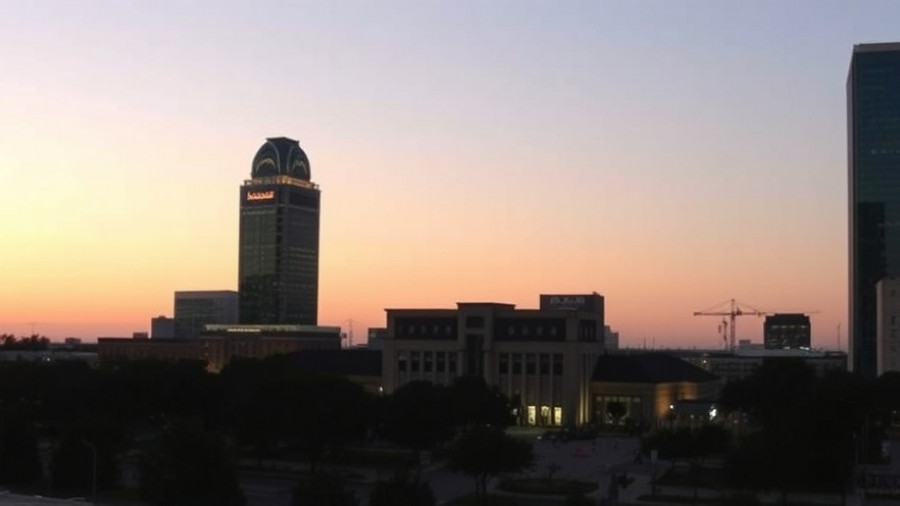
Plano City Council Takes a Stand Against Oncor's Proposed Rate Increase
The Plano City Council has officially opposed Oncor Electric's staggering $834 million rate increase, which threatens to hike residential electricity rates by 12.3% and street lighting costs by a striking 51%. As the city council took this bold action at their recent meeting on October 13, it aligns with a growing trend among Texas municipalities rallying against the utility’s demands.
The Context of the Rate Increase Request
In June, Oncor submitted an application to the Public Utility Commission of Texas, seeking to raise both electricity transmission and distribution rates significantly. Several factors spurred this request, including the need to recover costs associated with storm damages (which account for nearly half of the requested increase), along with rising operational expenses attributed to inflation and the necessity to maintain financial stability in light of growing infrastructure demands.
Andrew Fortune, director of policy and government relations for Plano, described the company’s request as an "extraordinary increase." He emphasized that, given the current financial landscape, residents are already grappling with heightened costs of living, making this proposed rate hike appear staggeringly excessive.
Broader Implications for Residents
If Oncor's request were to be approved, Plano residents would see an average increase of $7.90 in their monthly electric bills. This increase comes at a time when many Texans are still recovering from financial setbacks incurred during the pandemic, making any additional expenses a heavy burden for households.
Besides the direct financial implications, this rate increase would also impact the city's ability to provide well-lit streets, as the proposed 51% rise in street lighting rates directly affects local public safety and infrastructure management.
A Coalition Response from Texas Cities
Plano is not alone in this fight. The city is a part of the Steering Committee of Cities Served by Oncor, a coalition aimed at advocating for fair electric rates across the region. This cooperative effort sees numerous Texas city councils combining forces to push back against Oncor's proposals and any rates deemed unreasonable.
All cities with the power to regulate electric rates must officially deny Oncor's rate increase by the deadline of October 29, solidifying a collective voice against the utility's demands.
The Historical Context of Rate Increases in Texas
The history of utility rate hikes in Texas has often been contentious, marked by past incidents where residents faced crippling increases after severe weather events. The events of February 2021 stand out as a pertinent example when extreme winter conditions led to over four million Texans losing power amidst a catastrophic grid failure.
This incident called attention to Oncor’s operational practices, and subsequent council meetings have highlighted the utility's lack of preparedness and communication during emergency situations, further fueling opposition to rate increases in the aftermath of such failures.
The Need for Community Awareness and Vigilance
This recent council resolution reflects a vital need for community engagement in local governance. It’s not merely about resisting immediate financial adverse effects—it's also about ensuring regional utility companies remain accountable to the citizens they serve. Residents of Plano and surrounding areas must stay informed about these developments and actively participate in related discussions and meetings.
Moving Forward: Local Advocacy Strategies
Residents who want to make their voices heard regarding utility rates can engage in several effective actions. Attending city council meetings, utilizing platforms like social media for awareness campaigns, and possibly joining advocacy groups focused on consumer rights can amplify the call for accountability from Oncor.
Additionally, being aware of one’s own consumption and exploring alternative energy solutions, such as solar power, can empower residents to take control of their energy costs, fostering a more sustainable and financially manageable future.
As the local political landscape evolves, civil engagement will be crucial in shaping policies that directly affect daily life in communities across Texas. For residents interested in supporting efforts to keep utility costs reasonable or learning more, they are encouraged to follow local news sources and remain active in community initiatives.
To become an informed participant in the conversation regarding utility rates, consider attending the next city council meeting and voicing your thoughts. Only through active participation can we influence the decision-making processes that impact our residential finances and local infrastructure.
 Add Element
Add Element  Add Row
Add Row 



Write A Comment